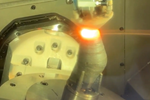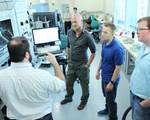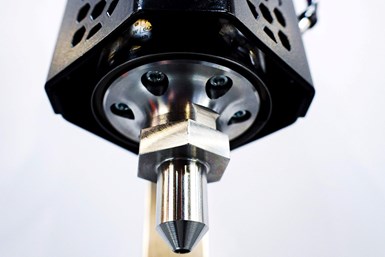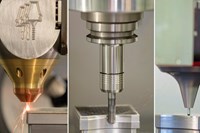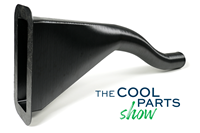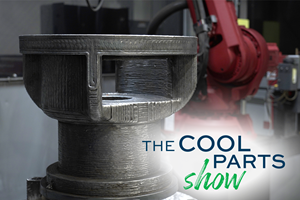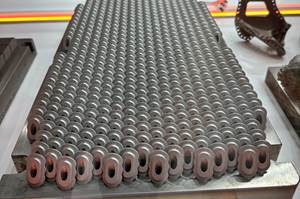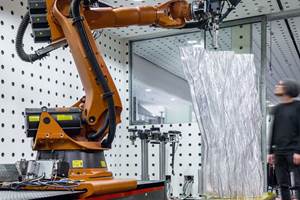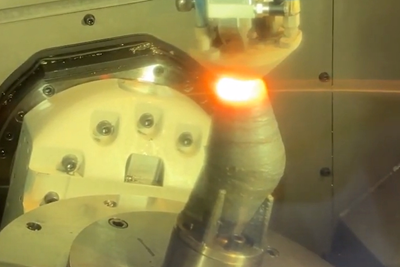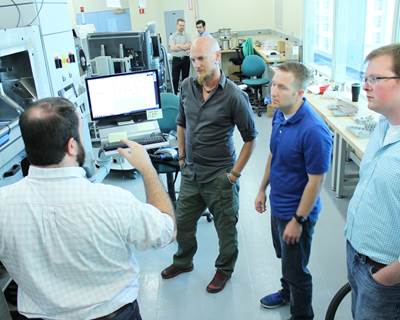Consortium Aims to Bring High-Value 3D Printing to UK
Additive manufacturing experts aim to create accessible, large-format additive manufacturing technology that will make UK manufacturing more competitive and sustainable.
Share
Read Next
Additive manufacturing (AM) experts in the United Kingdom are working on the EVO One large-format additive manufacturing (LFAM) project to create a 3D printer system that could make UK manufacturers more competitive in the international market. The initiative has received £1.1 million in funding from Innovate UK, the UK’s innovation agency.
Collaborators on the EVO One LFAM project include EVO 3D; the National Manufacturing Institute Scotland (NMIS) operated by the University of Strathclyde and part of the High Value Manufacturing Catapult (HVMC); Rolls-Royce; materials supplier Filamentive; software developer AI Build; and energy technology company Baker Hughes.
The advanced technology being developed by this global consortium of companies and academic institutions could revolutionize the use of industrial AM in the UK, bringing the advanced manufacturing of high-value components for key industries to the country for the first time.
LFAM is a commercial 3D printing technique that creates large-volume polymer components, used in a variety of industries, including aerospace, automotive, energy and marine. While countries like the U.S., Germany and China have embraced this approach, the group says there are currently no manufacturers of large-format 3D printers in the UK. Also, the UK only accounts for around 5% of the global AM market, which the UK government aims to increase to 8% by 2025.
Access to the right technologies will be a crucial part of achieving that aim, but existing LFAM systems have their limitations. These include slow build times, being unsuitable for high-value or high-integrity parts, operational complexity, use of unsustainable materials, and being unaffordable for small- and medium-sized companies.
The new product being developed through Evo One LFAM will address the challenges associated with these systems and cater to the specific needs of the UK Market. The system’s design team is aiming to make it 60% more reliable, achieve a 50% increase in productivity, reduce training and maintenance costs by 30%, and cut material waste by 80%, among a range of other improvements.
On the project’s completion, Evo-3D will launch a spinout business to commercialize the system, called RapidFusion, creating the UK’s first original equipment manufacturer (OEM) in LFAM. Its development would also create the foundation on which a new supply chain can be built, reshore critical manufacturing capabilities, and help more UK manufacturers take advantage of the opportunities presented by Industry 4.0.
“The UK is behind other major economies when it comes to LFAM. What we are aiming to do through the development of this system is democratise high-value, environmentally responsible manufacturing in the UK through a system that will bring the latest technology and capabilities to large and small businesses,” says Jake Hand, director of marketing and development at EVO 3D. ““We saw during the pandemic how easily supply chains can crumble. That’s why it’s potentially more important than it ever has been to develop as much capacity and capability in the UK as we can, not to mention the economic and carbon reduction opportunities associated with having a thriving manufacturing sector at the vanguard of the latest available green technologies.”
The NMIS team will support the project across a number areas, including material analysis, design and the AM process. It will also look at the validation and verification of the system and high-value materials being used. Rolls-Royce and Baker Hughes will test the system once it is ready, while AI Build will help with the development of the slicing technology.
“We have a huge opportunity in the UK to be a leader in large format additive manufacturing. Putting the right technology in as many manufacturers’ hands as we can is a great base to build on, and having a UK-based OEM is the first step in that direction,” says Stephen Fitzpatrick, director – digital factory at NMIS. “With the right tools at our disposal, we can encourage more manufacturers of all sizes to embrace the latest manufacturing techniques and technologies, paving the way for a more sustainable and globally competitive sector.”
Related Content
500-Pound Replacement Part 3D Printed by Robot: The Cool Parts Show #50
Our biggest metal cool part so far: Wire arc additive manufacturing delivers a replacement (and upgrade) for a critical bearing housing on a large piece of industrial machinery.
Read More8 Cool Parts From Formnext 2023: The Cool Parts Show #65
New additive manufacturing technologies on display at Formnext were in many cases producing notable end-use components. Here are some of the coolest parts we found at this year’s show.
Read MoreHow Large-Format 3D Printing Supports Micro-Scale Hydropower
There is potential hydroelectric power that has never been unlocked because of the difficulty in capturing it. At Cadens, additive manufacturing is the key to customizing micro-scale water turbine systems to generate electricity from smaller dams and waterways.
Read More3D Printing Brings Sustainability, Accessibility to Glass Manufacturing
Australian startup Maple Glass Printing has developed a process for extruding glass into artwork, lab implements and architectural elements. Along the way, the company has also found more efficient ways of recycling this material.
Read MoreRead Next
Hybrid Additive Manufacturing Machine Tools Continue to Make Gains (Includes Video)
The hybrid machine tool is an idea that continues to advance. Two important developments of recent years expand the possibilities for this platform.
Read MoreAt General Atomics, Do Unmanned Aerial Systems Reveal the Future of Aircraft Manufacturing?
The maker of the Predator and SkyGuardian remote aircraft can implement additive manufacturing more rapidly and widely than the makers of other types of planes. The role of 3D printing in current and future UAS components hints at how far AM can go to save cost and time in aircraft production and design.
Read More4 Ways the Education and Training Challenge Is Different for Additive Manufacturing
The advance of additive manufacturing means we need more professionals educated in AM technology.
Read More

